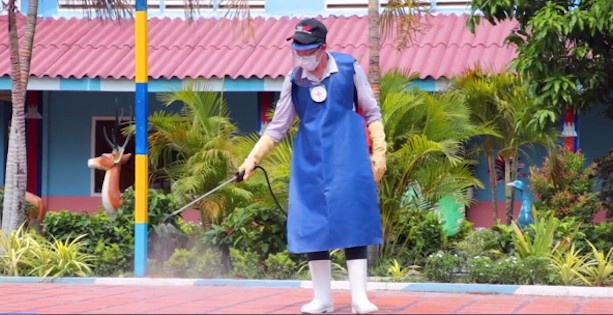
COVID-19 in Asia, the ICRC support in congested jails of the Philippines, Cambodia and Bangladesh
The official release issued by the ICRC reports that COVID-19 is now spreading also into Asian jails where social distancing cannot be respected. Avoiding the infection is almost impossible in prison. That’s why the ICRC stand up to support the critical situation in jails.
The support of the ICRC in jails: COVID-19 in the Philippines
With COVID-19 now spreading on every continent, distancing has become the new normal. But the rules for avoiding infection are almost impossible in prison. In the Philippines, detention facilities are among the most congested in the world. Some inmates have so little space, they must take turns to lie down to sleep. In such an environment, the risk of disease spreading is high, and already, a case of COVID-19 has been reported in one of Manila’s jails.
In the Philippines, detention facilities are among the most congested in the world. Some inmates have so little space, they must take turns to lie down to sleep. In such an environment, the risk of disease spreading is high, and already, a case of COVID-19 has been reported in one of Manila’s jails”, the press release reports about Asia.
The deputy chief of the Bureau of Jail Management and Penology Dennis Rocamora affirms: “Jails will not be exempt from this pandemic. We know that once it enters the jail, it will easily spread because the number one precaution in fighting the COVID – what we call physical distancing – is impossible in a congested jail.”
The ICRC is working closely with Philippines detention officials to prepare for a possible outbreak; setting up four isolation centres for inmates who test positive for COVID-19, or those who may show symptoms.
The support of the ICRC in jails: what happens in Cambodia?
In Cambodia too the ICRC has stepped in to support disease control and prevention in prisons. Detention facilities are often overcrowded, with poor ventilation. ICRC teams are working with the Cambodian authorities to provide tonnes of much-needed hygiene and personal protection items, in a bid to safeguard more than 38,000 inmates and 4,000 prison staff.
“COVID-19 is a global pandemic which has consequences all around the world,” says Roman Paramonov, the ICRC’s head of mission in Phnom Penh. “Everyone is fighting against the virus, and it’s not only Cambodia. One of our main concerns is people deprived of freedom. They are often packed in limited space, for them, maintenance of social distancing is a luxury.”
ICRC staff in Cambodia are also providing training and technical support to the authorities and working to ensure that families of detainees can remain in contact with them while taking all possible measures to control the spread of the virus.
The support of the ICRC in jails: the situation in Bangladesh
In Bangladesh, the ICRC is working with the Prison Directorate and the Ministry of Home Affairs to help the country’s 68 prisons prepare for a possible outbreak of COVID-19. Disinfection materials have been distributed to Bangladesh’s central prison in Keranigani, and training in how to use it has been organized for prison staff.
“Bangladesh’s 68 prisons are being assisted by the ICRC to establish decontamination and screening points at the entrance,” explains Massimo Russo, the ICRC’s water and sanitation coordinator based in Dhaka. “As well as implementing disinfection processes inside the security perimeter. 68 prisons is a high number, and mobility is reduced because the country is locked down, so this poses a great challenge for us to implement our programme.”
But despite the challenges, the ICRC is determined to continue its work; prisons are places of detention, but they should not be places where disease can spread. In the Philippines, a 48-bed isolation facility is now ready to go, and ICRC Health in Detention Program Manager Harry Tubangi is justifiably proud of the work that has been done.
“Here inside we see there are six beds on the left, and six on the right. You see they are the correct distance apart,” he explains.
“This is important for facilities like these, that the principles to control infection are followed. That’s why part of what we are doing with the BJMP staff is training and technical support. We teach them how to disinfect, how to move. And we also give them material support to fight the infection and make sure the facility is safe and clean.”
The new facility will, it is hoped, prevent the spread of infection in overcrowded prisons, and protect detainees who are especially at risk. A significant number already have pre-existing conditions associated with increased severity of COVID-19, such as heart disease, high blood pressure, cancer, and diabetes.


